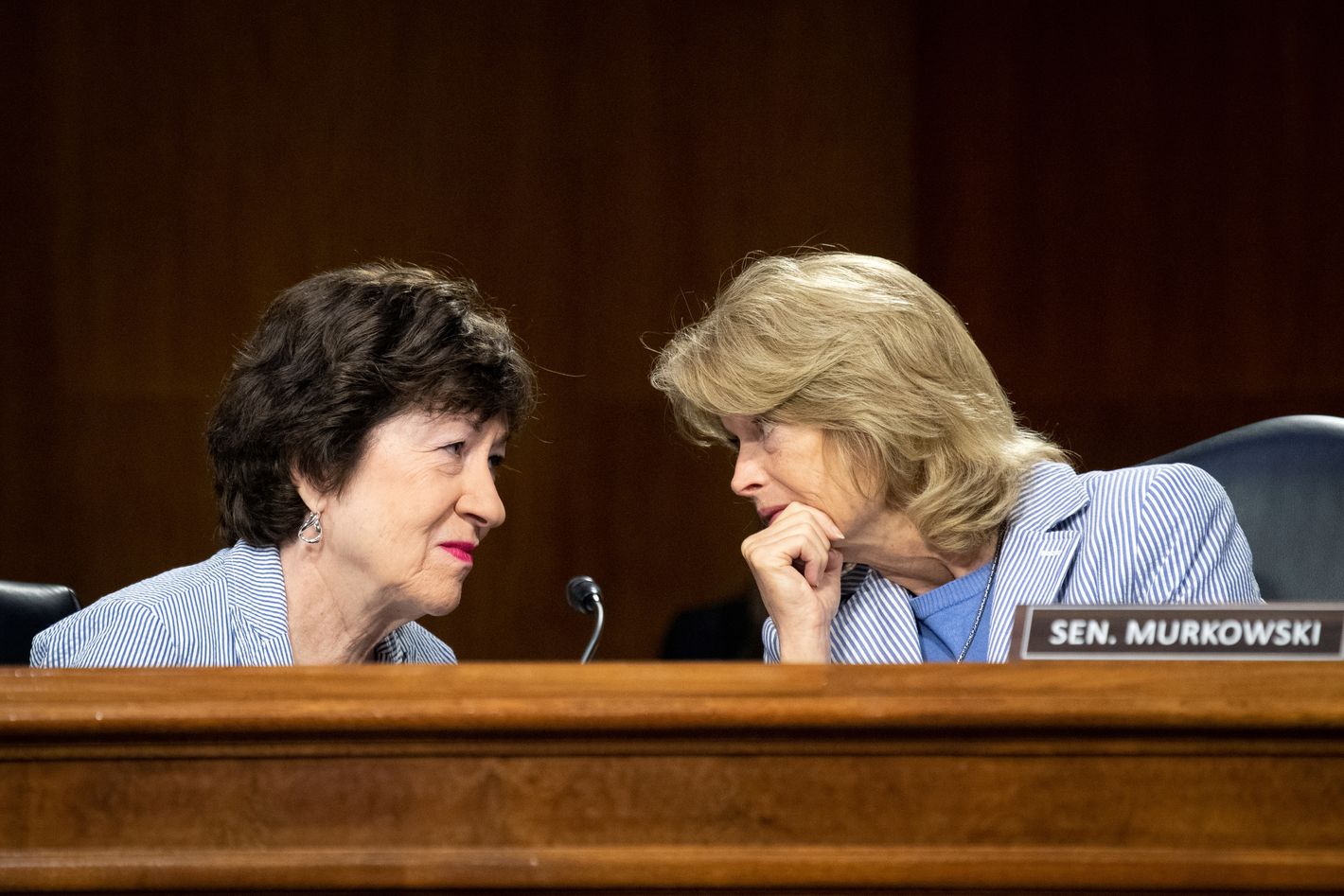Caroline Brehman/Pool/Reuters
Even as handicappers adjudged Pete Hegseth’s confirmation as secretary of Defense to be all but certain, not one but two Republican senators indicated a hard pass on the poorly qualified bad boy from Fox News. They were Lisa Murkowski of Alaska and Susan Collins of Maine, who voted against a procedural motion to clear the decks for Hegseth’s confirmation by the full Senate. In explaining their positions, both senators mentioned Hegseth’s lack of relevant experience and his history of outspoken hostility toward increased combat roles for women in the military. Neither specifically cited the scattered if persistent reports of violent behavior toward women in Hegseth’s background, though that has been a lingering problem for this nomination.
While it’s tempting to stress the gender of these rebels against Trump’s nominee as explaining their refusal to go along with the president’s wishes, it’s worth noting that seven other Republican women in the Senate (Marsha Blackburn, Katie Britt, Shelley Moore Capito, Deb Fischer, Cindy Hyde-Smith, Cynthia Lummis, and most significantly senior Armed Services Committee member Joni Ernst) profess not to have a problem with Hegseth. But it’s important to note that Collins and Murkowski have very specific reasons for being heterodox Republicans and that the partisan math in the Senate makes it possible for them to stray now without damaging Trump’s agenda.
Murkowski is the most obvious candidate for a free pass to vote her conscience. She has the remarkable record of having twice won election against the wishes of her own party. In 2010, after losing the GOP primary to tea-party conservative Joe Miller, she won the general election via a rare write-in campaign. Then in 2022, she won a fourth full term despite being opposed by the Alaska GOP, taking advantage of the state’s new top-four/ranked-choice vote system that enabled both Murkowski and Democratic House candidate Mary Peltola (who endorsed each other) to put together a winning centrist coalition.
The Alaskan is very openly hated by Trump, who opposed her reelection in 2022 after she voted against both Obamacare repeal and the Kavanaugh confirmation; she reciprocated by refusing to endorse him in the 2024 general election. She has publicly mulled leaving the GOP but benefits from being in the majority party. So you’d figure she will vote against her party whenever it’s convenient, and it won’t make a difference.
To some extent, that’s also true of Collins, who has been in the Senate even longer (five full terms) than Murkowski and who is unique among Senate Republicans in representing a state that has gone Democratic in all three of Trump’s presidential election years (indeed, Maine last went Republican in a presidential election in 1988, though its system of awarding one electoral vote for the winner of each congressional district gave Trump an electoral vote in 2016, 2020, and 2024). Like Murkowski, she did not endorse Trump in the 2024 general election but has managed to escape any regular expressions of Trumpian wrath. Assuming she runs for a sixth term in 2026 at the age of 74, she’ll need to avoid the distraction of a Republican primary but will also need to win Democratic votes as she has done in the past. So you can expect her to project some degree of independence going forward. She joined Murkowski and John McCain in helping to sink the Obamacare repeal legislation in 2017 but conspicuously backed the Kavanaugh confirmation at a critical moment.
Fortunately for Trump and for Senate Majority Leader John Thune, Republicans won a three-seat margin in the upper chamber in 2024, and Vice-President J.D. Vance’s tie-breaking vote gives them a four-vote cushion. So the key question in 2025 is whether there are additional Republican votes that are in question on any key measure.
There are two suspects to keep your eyes on. The first is Louisiana senator Bill Cassidy, who shocked a lot of constituents by voting to convict Trump of impeachment charges after the January 6, 2021, attempted insurrection. The bad news for him is that he’s up for reelection in 2026 immediately after Louisiana abandoned its nonpartisan jungle primary system, so he’ll face a closed GOP primary. A former congressman and Trump aide, state treasurer John Fleming, has already announced a challenge to Cassidy. But the incumbent’s strategy will clearly depend on reassuring MAGA voters he’s reliable, which makes him an unlikely heretic on key votes.
Then there’s former longtime Senate Republican leader Mitch McConnell. The Kentuckian is 82 years old and in poor health (which forced his retirement as leader); he’s very likely to retire from the Senate when his current term ends in 2026. He spent Trump’s first term as a distinct frenemy who mostly did what Trump wanted him to do but made it clear he held the 45th president in low regard, particularly when it came to his conduct on January 6. But whatever else he is, McConnell is a party man through and through, and it’s unlikely he’ll sabotage his successor Thune.
So Trump and Thune are in pretty good shape despite occasional or even regular defections from the likes of Collins and Murkowski. Thune will have to keep an eye on some of the more radical conservatives in his conference — senators like Mike Lee and Rand Paul — who might make common cause with the fiscal hard-liners of the House Freedom Caucus to demand deeper budget cuts than Trump feels necessary. But that’s where Trump will need to exert himself instead of standing aside and letting his troops squabble, as he sometimes does.

